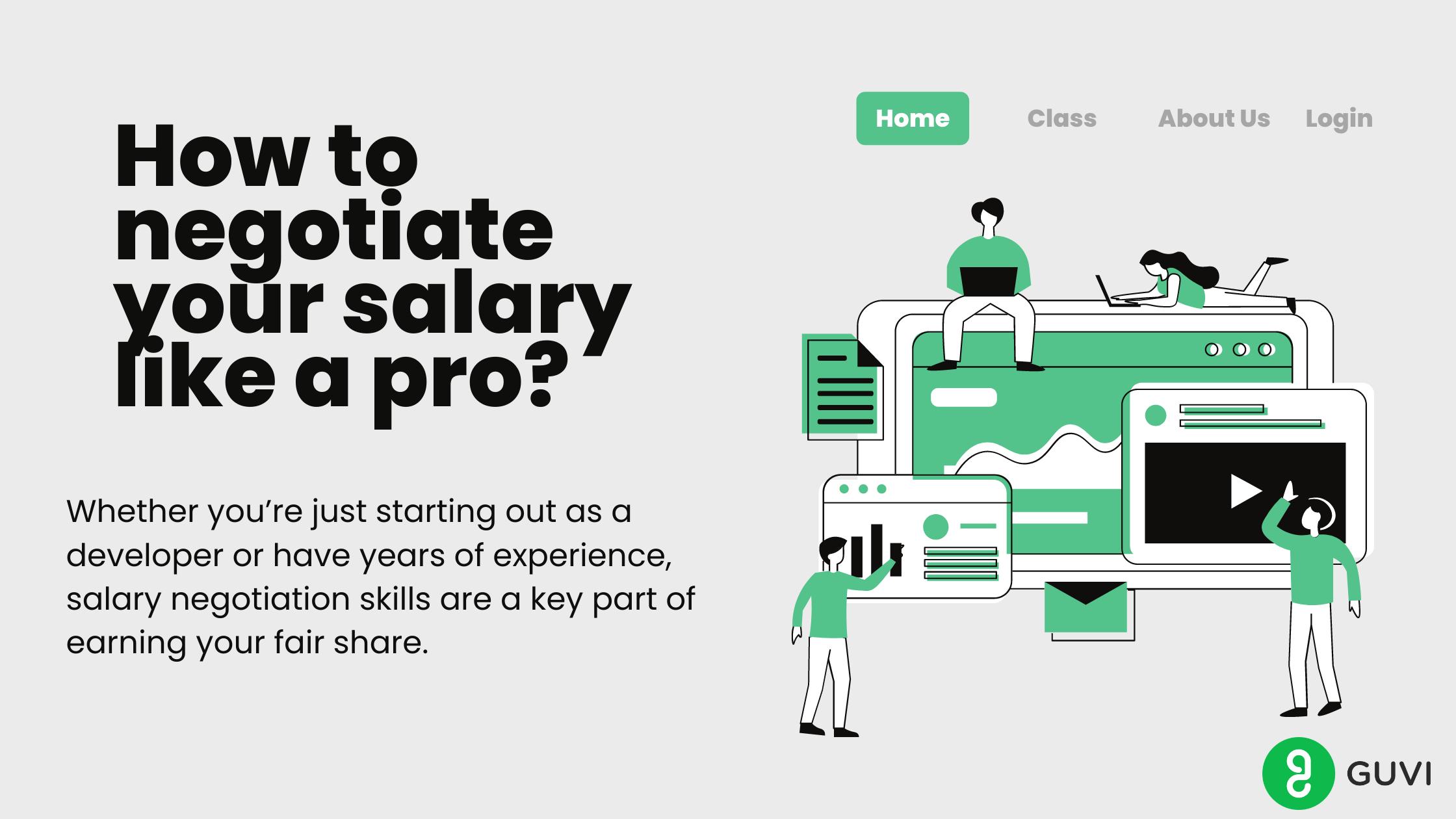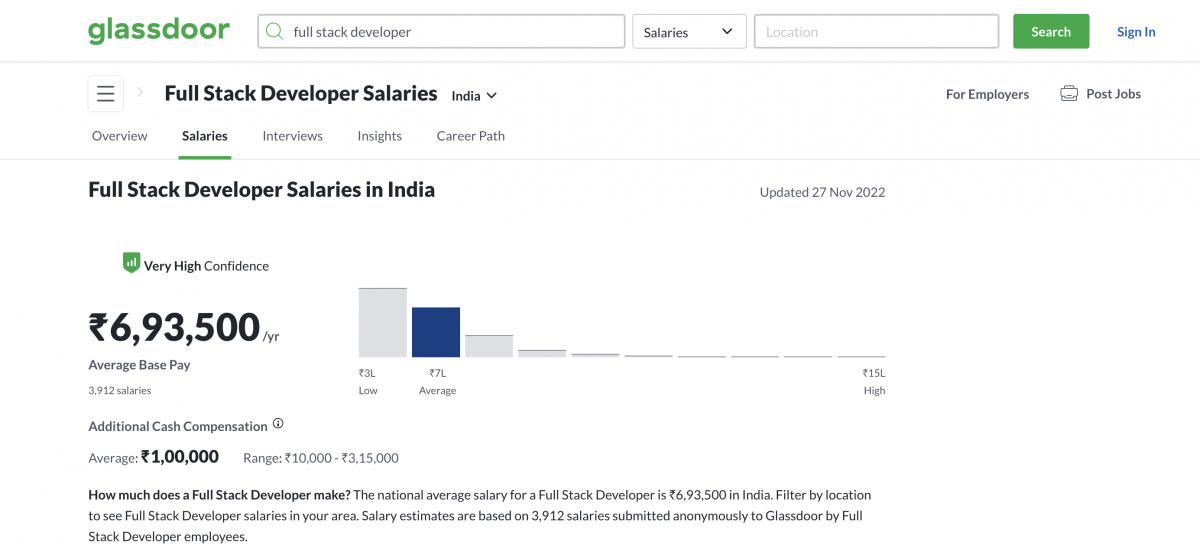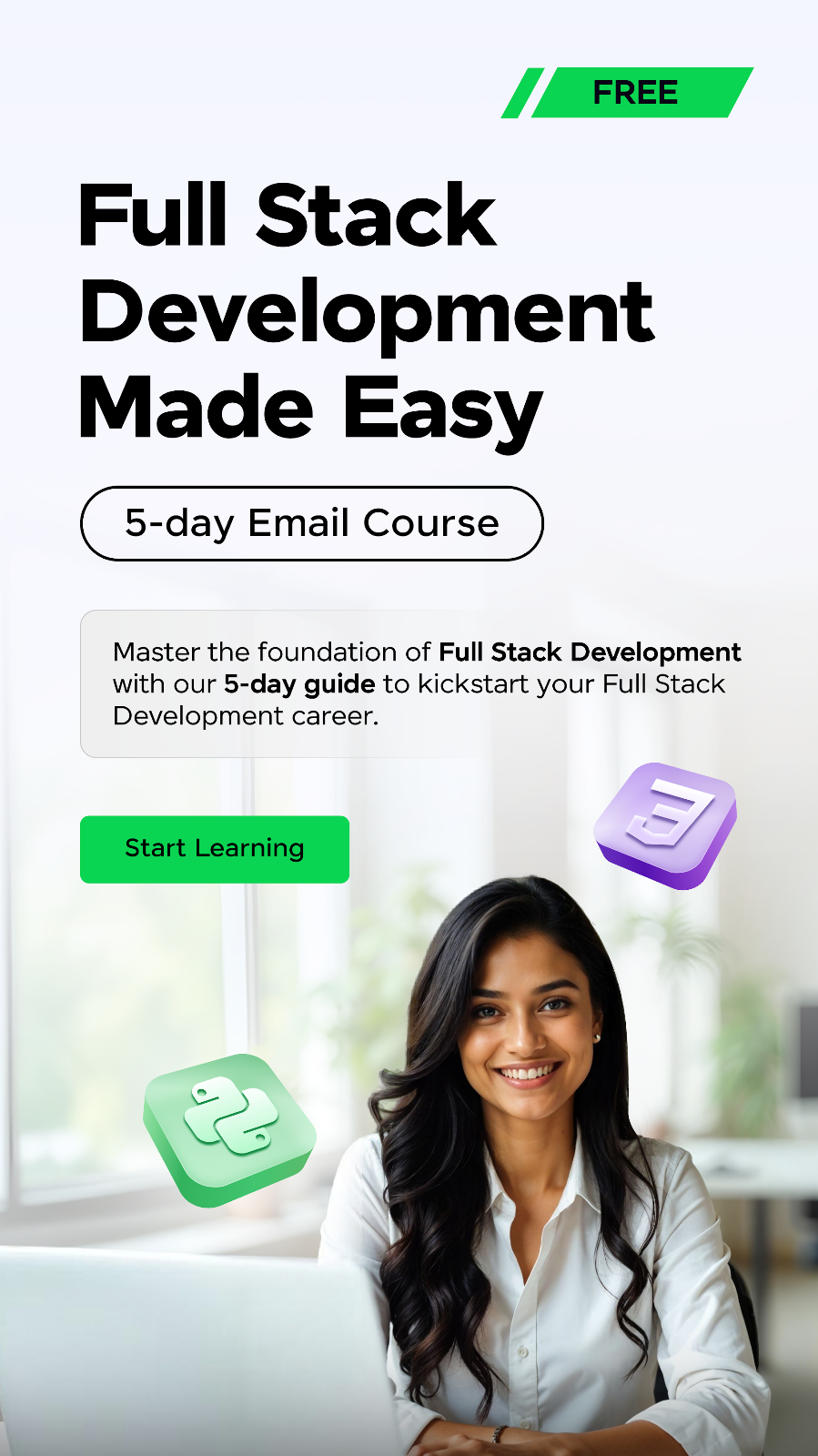
5 Tips to negotiate your salary as a Full Stack Developer
Mar 06, 2025 5 Min Read 2668 Views
(Last Updated)
Negotiation is such an important life skill. We are negotiating constantly, whether it’s for salary, whether it’s for a project, whether it’s for a relationship, whether it’s something we have to get from our parents, from our siblings, from our friends. On every note of life, we’re constantly just getting into conversations with individuals, trying to figure out how they can agree to what we want.
But most importantly, negotiation helps us secure a better pay grade. Especially Tech jobs, which are notorious for their high pay variance. Even developers of the same tier may have salaries that differ by a significant percentage. There are specifically difficult for most developers since communication is not their brightest forte. Sigh. But don’t worry, today we will be sharing some great tips that can help you leverage your skills for a better pay grade so that you don’t walk into your next interview unprepared. This is a guide on how to negotiate your salary as a Full-Stack Developer.
Table of contents
- Never disclose your salary expectations or make them open-ended. Don't sell short.
- When is the best time to decide on a number?
- Do Your Homework- Decide on the lowest number you'll accept & consider other benefits
- Also focus on your company's wants, along with yours
- Practice your negotiations beforehand
1. Never disclose your salary expectations or make them open-ended. Don’t sell short.
Specifically, We all have a lot of questions about this, but the first question that we had is when a recruiter asks you what are your salary expectations?
What’s the best way, what’s the golden answer, the dos and don’ts of how to respond to that question?
Don’t give them that number. Don’t give them that range, the range of a full-stack developer is really large. You don’t know where you land in that compensation band and so we would recommend pushing back on that recruiter, and you don’t have to answer anything either. If you don’t know the answer, just let them know. Usually, recruiters are pretty respectful of that.
So the recruiter can push for it, the recruiter can ask, & they are entitled to ask, but as the candidate, you’re not obligated to answer that question.
It is recommended that you should say “I expect to be compensated competitively” which is fine, because as soon as you put a number out there, you basically might already be giving yourself away at a discount, which is great for the company because then they’re like “wow we get someone at this caliber for this cheap, great! let’s just like keep going with their number!” when in fact, you’re actually worth a lot more.
It’s just like, once you give a number, the recruiter will hold you to it. So let’s suppose if you say 8 Lakhs per annum in total compensation, they will give you exactly that, like, nothing more, nothing less. And let’s say you start interviewing with another company, and they give you 10 lakhs.
And then you can’t come back and be like, “well just kidding, like, now I want 10 Lakhs”.
You know, now the recruiter can say, “wow they came back, and tell me the other competing offer, which implies they really want this position. I’m not gonna move the needle, and they will eventually cave and it’s the best offer.” If you encounter a really aggressive recruiter, they’ll do that. And then another thing too, when they give you the range, don’t say yes, don’t say no.
Let’s say you flip it back on them, let’s say the recruiter tells you, “All right well the range is 7 Lakh-12 Lakh, how does that sound to you? Do you like this number? Avoid saying, “yeah no that sounds great” or “no that’s really low” Keep things a little bit more open-ended by saying, “that’s a really good start” So yeah, this is how you open that door to yourself to negotiate later.
It’s like you leave it as lukewarm as possible, for as long as possible. With negotiation, you want to use really neutral verbiage here. You don’t want to under share, but you don’t want to overshare at the same time.
Before diving into the next section, ensure you’re solid on full-stack development essentials like front-end frameworks, back-end technologies, and database management. If you are looking for a detailed Full Stack Development career program, you can join GUVI’s Full Stack Development Course with placement assistance. You will be able to master the MERN stack (MongoDB, Express.js, React, Node.js) and build real-life projects.
2. When is the best time to decide on a number?
So then at what point do you actually give a number, or like who’s the… who should be the first one to give a number then?
So even at the very end when the recruiter shares with you the good news like, “All right the team really loves you, they thought you do really well in (ABCD), they see a lot of growth potential in you, & we’re ready to move on to the offer stage, what are you looking for?”
Even at that stage, We still would recommend: don’t give your number. You want to take this call to really understand their compensation philosophy. They can’t just be pushing for a number when they don’t tell you what goes into it, right?
You can’t make a decision without being informed, so push it back on them and say: “truthfully, you know, I’ve been really busy prepping for the interview, I haven’t put much thought into it. If you don’t mind…
You know, once they go over everything again, you can just push it back on them one more time saying, “you know, this is a little bit newer for me and everyone has a different compensation structure, I know I’m not comparing apples to apples. If you don’t mind just sharing the numbers with me first, it would be super productive or effective or super helpful for me, I would greatly appreciate it.”
It’s almost like a game of poker. You’re just like, waiting for them to fold, just waiting and waiting and then having them be the first to show their hand. and like once the recruiter has to explain everything to you, they’ll just be like “Okay as I might as well just share a number now.“ So don’t throw your cards first.
3. Do Your Homework- Decide on the lowest number you’ll accept & consider other benefits
Here’s a fact. Only 25% of people said they’re happy with their current salaries in a recent survey.
But knowing how to ask for more takes preparation and practice. The first step, do your homework. Get familiar with the lowest average and the highest salary for the position. Remember to account for things like location, experience, certifications, and education. You see, negotiation is a conversation that is about gives and takes. You have to know what you want while also knowing where the other person’s coming from. A fair way to start the negotiation is by asking for slightly more than your goal. But stay flexible. Understand that if you give a range, the employer will likely lean toward the lower number. That’s why the bottom of your range should still be something you’re comfortable accepting.

At that stage, you’ve already gone through & cracked the entire interview process, you got a sense of the company culture, you got a sense of what they’re looking for in this role, and you have their compensation philosophy together. You can piece all of those together, even, that when they give you a number, you have the data and information to be able to confidently say
“Actually, based on what I know and what I’ve learned, I think I’m this much instead.”
You want to do a lot of the asking good questions during that call. For asking about the bonus structure: how does that work typically, when is the payout, is it once a year, is it twice a year, are there any other bonuses on top of it, signing bonus that you guys offer, vacation weeks and things like that.
And for the companies that don’t offer a bonus, that’s the perfect window for you to use that as leverage against them like, “hey since you don’t offer me any bonuses, what I want to be mindful of is Inflation, and you know living costs just keep going up. So essentially if I don’t take this into consideration now, the longer I stay with the company, essentially the less my take-home pay is going to be, and I don’t want to be in a position where salary is a thing for me to have to leave the company, so I hope you understand where I’m coming from.”
Read Top 10 Most-asked Full Stack Developer Interview Questions.
4. Also focus on your company’s wants, along with yours
If you are negotiating for a higher salary range than average, this ultimately comes down to what you can do for the company, or what you bring to the table. This argument is often undermined if you are pressing only upon what you want and why you deserve a higher pay grade than usual.
It further moves the whole conversation away from a logical argument to an emphatic request to the company to meet your desires. This can weaken the compelling case that you’ve made up to the point. Instead, focus on the company’s needs and try to fulfill them. Keep the conversation centered on the value you provide and how the company can fairly compensate you for that.
For instance: Instead of making an overtly ardent case on how you’re deserving tell them “I’ve been leading /part of one of the fastest-growing open-source projects and some of our contributors are developers for some of the biggest tech companies. So I’ve been able to see how industry leaders operate and will be able to help your company with collaboration”
5. Practice your negotiations beforehand
It’s a no-brainer if we preach that you should practice your negotiations aloud and review all the common rebuttals. The best way to do this is to take help from your mentors and do mock negotiations with your friend or family. This is extremely important because many of us are conditioned to not talk about money. Practicing it with a colleague or friend helps you develop a natural flow and remove any sort of hesitation. Use voice memos and revision to ensure that you’re speaking in a normal voice range.
Give them a series of questions like:
- Have you received any other offers? What are they?
- How did you pick your chosen salary range?
- Is this company your top choice? & more
After you’re done, ask your friend for feedback. Negotiating your salary is a difficult skill to learn but practice will help you get better each time.
That brings us to the end of this article. I hope this article will help you counsel in your career and now you can negotiate your salary effectively and logically. Do you agree with our list, or you wanna add some more points? Feel Free to tell us in the comments. We’d be happy to update this article.
The journey looks different for everyone. Read the stories and advice from people, just like you, who have changed their lives by upskilling themselves with the latest technologies.
Kickstart your Full Stack Development journey by enrolling in GUVI’s certified Full Stack Development Course with placement assistance where you will master the MERN stack (MongoDB, Express.js, React, Node.js) and build interesting real-life projects. This program is crafted by our team of experts to help you upskill and assist you in placements.
Alternatively, if you want to explore JavaScript through a self-paced course, try GUVI’s JavaScript course.























![Top 40 Java Full Stack Developer Interview Questions and Answers [2025] 4 java full stack developer interview questions](https://www.guvi.in/blog/wp-content/uploads/2025/06/Top-40-Java-Full-Stack-Developer-Interview-Questions-and-Answers.png)




![Top Frontend Developer Skills: A Beginner's Guide [2025] 9 frontend developer skills](https://www.guvi.in/blog/wp-content/uploads/2023/03/Top-Frontend-Developer-Skills-A-Beginners-Guide.png)

![Top 10 React Native Project Ideas [With Source Code] 11 React Native Project Ideas](https://www.guvi.in/blog/wp-content/uploads/2024/10/React_Project_Ideas.png)


Did you enjoy this article?